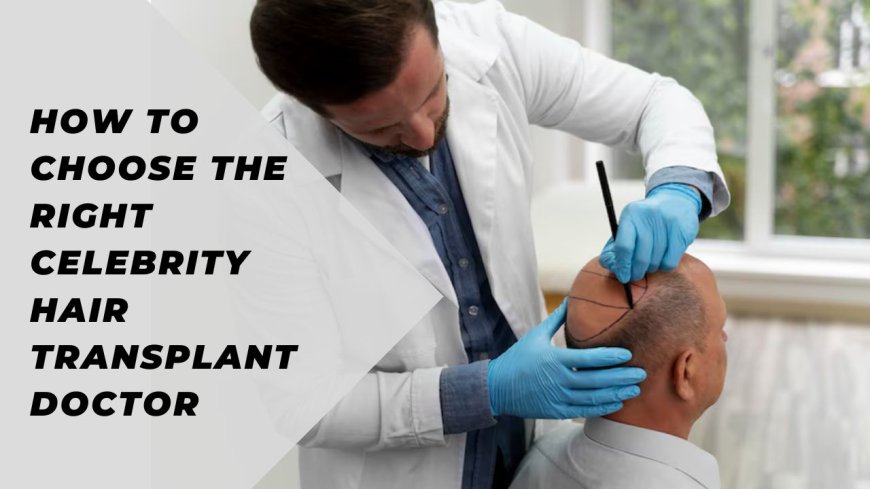How to Choose the Right Celebrity Hair Transplant Doctor
Discover how to choose the right celebrity hair transplant doctor based on education, experience, procedure knowledge, results, and post-care considerations.

Hair is more than just a physical featureit plays a major role in identity, confidence, and how we present ourselves to the world. For celebrities, whose appearance is constantly under public scrutiny, maintaining a youthful and full head of hair can be especially important. Hair loss can lead to a failure of self-esteem, and for many, a hair transplant becomes a viable and long-term solution.
However, the outcome of a hair transplant is only as good as the professional performing it. Thats why choosing the right celebrity hair transplant doctor is a crucial decisionone that involves more than just flashy credentials or online popularity.
This guide guides how to carefully and thoughtfully select a hair restoration doctor who meets the highest standards of expertise, ethics, and patient care.
Understand the Importance of the Doctors Role
Celebrity Hair transplantation is both a medical and artistic procedure. It requires clinical precision and an eye for natural aesthetics. The doctors approach significantly influences the quality of the hairline design, the survival rate of transplanted follicles, and the overall appearance of the results.
Beyond the technical aspects, a skilled doctor also plays a psychological role. They help patients feel reassured, heard, and confident about the decision to undergo the procedure. In the case of celebrities, where appearance directly impacts careers and public image, this trust becomes even more essential.
Evaluate Educational Background
Start with the basics: ask about the doctors medical training. Hair transplantation is a specialised field, and the best practitioners often come from backgrounds in dermatology or cosmetic surgery. Look for credentials like an M.D. degree and additional certifications in hair restoration techniques.
Its not just about having a licenseits about how deep their understanding is of skin physiology, hair growth cycles, and surgical techniques specific to transplantation. A well-educated doctor will also be up-to-date with new technologies and ethical medical practices.
Consider ExperienceNot Just Years, but Relevance
Experience in hair transplantation isnt only about how long a doctor has been practising. Its about the number of procedures theyve performed, the variety of cases theyve handled, and how often they work with patients who require discreet, high-impact results, such as actors, musicians, or media personalities.
Look into the doctors case history. Have they treated individuals with diverse hair types and levels of hair loss? Do they tailor their methods to meet individual needs? A strong track record in personalised care and consistent outcomes is a good sign of professional maturity.
Learn the Basics of the Procedure First
Before consulting a doctor, do your homework. Learn the difference between FUE (Follicular Unit Extraction) and FUT (Follicular Unit Transplantation), understand what a donor area is, and become familiar with recovery timelines. This background will empower you to ask more informed questions and assess the clarity of the doctors responses.
When speaking with a hair transplant doctor, ask them to walk you through their procedure step by step. A trustworthy expert will explain the process in detail and ensure that youre comfortable with every phase, from planning the hairline to post-surgery care.
Ask About Real ResultsThe Good and the Bad
Any qualified professional should be transparent about their outcomes. Ask to see before-and-after photos of past patients, preferably those with a similar hair type or hairline pattern as yours. What do their results look like after several months or even a year?
Equally important, ask about cases that didnt go as expected. What happened, and how did the doctor handle it? Honest conversations about complications or imperfect outcomes demonstrate responsibility and real-world experience, not just salesmanship.
Clarify Post-Procedure Expectations
Hair transplantation doesnt end when the surgery is complete. Recovery, shedding, regrowth, and maintenance are all part of the process. Some patients may require follow-up procedures or additional treatments such as PRP therapy (Platelet-Rich Plasma).
Ask your doctor about the full timeline and what kind of aftercare they recommend. Also, get clarity on potential hidden costs such as medication, follow-up consultations, or supplementary treatments. This will help you be mentally and financially prepared for the full scope of your hair restoration journey.
Why Choose Beverly Hills Hair Restoration?
Beverly Hills Hair Restoration stands out for its commitment to precision, patient care, and natural-looking results. With a team led by experienced professionals specialising in advanced techniques like FUE and FUT, the clinic is known for handling high-profile and celebrity cases with the utmost confidentiality. Each hair treatment is tailored to the individuals unique hair type, facial structure, and restoration goals. Located in Los Angeles, the clinic offers a discreet, state-of-the-art environment where safety and aesthetics are prioritised. For those seeking expert guidance and trusted results, Beverly Hills Hair Restoration is a respected name in the field.
Conclusion
Hair transplantation can be a life-changing experiencebut only when performed by the right hands. For public figures, choosing the right celebrity hair transplant doctor is not only about aesthetics; its about privacy, professionalism, and long-term confidence.
By prioritising education, experience, transparency, and patient communication, you can make a decision that supports not just your hair but your overall well-being.









































